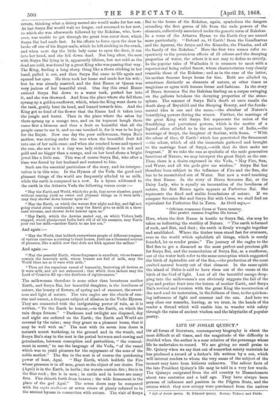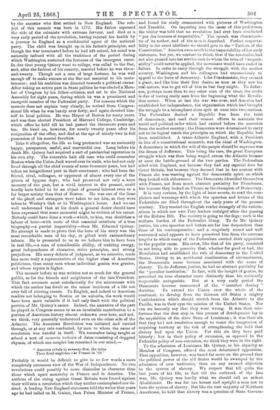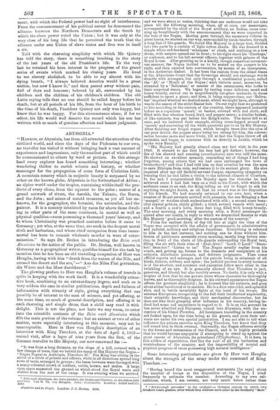LIFE OF JOSIAH QUINCY.*
OF all forms of literature, contemporary biography is about the most difficult at all times, and the magnitude of the difficulty is doubled when the author is a near relative of the personage whose life he undertakes to record. We are giving no small praise to Mr. Quincy when we say that out of somewhat scanty materials he has produced a record of a father's life written by a son, which will interest readers to whom the very name of the subject of the memoir may have been hitherto unknown. The salient facts of the late President Quincy's life may be told in a very few words. The Quincys emigrated from the old country to Massachussets about two centuries and a half ago. They have always been persons of influence and position in the Pilgrim State, and the estates which they now occupy were purchased from the natives • Life of Josiah Quincy. By Edmund Quincy. Boston: Ticknor and Fields.
by the ancestor who first settled in New England. The sub- ject of this memoir was born in 1772. His father espoused the side of the colonists with extreme fervour, and died at a very early period of the revolution, having injured his health by a journey to England as a confidential agent of the national party. The child was brought up in his father's principles, and though the war terminated before he had left school, his mind was naturally imbued with all the traditions of the period during which Washington sustained the fortunes of the insurgent cause.
In due time young Quincy went to college, was called to the Bar, and, after the fashion of his country, married before he was three- and-twenty. Though not a man of large fortune, he was well enough off to make success at the Bar not essential to his main- tenance; and his ambition was directed towards a political career.
After taking an active part in State politica he was elected a Mem- ber of Congress by his fellow-citizens, and sat in the National Assembly for eight years, during which he was a prominent and energetic member of the Federalist party. For reasons which the memoir does not explain very clearly, he retired from Congres- sional life when he was barely over forty, and again devoted him- self to local politics. He was Mayor of Boston for many years, and was then elected President of Harvard College, Cambridge, which office he held till he had passed the threescore years and ten. He lived on, however, for nearly twenty years after his resignation of the office, and died at the age of ninety-two in full possession of his mental faculties.
Take it altogether, the life so long protracted was an eminently happy, prosperous, useful, and uneventful one. Long before his death Mr. Quincy had acquired a sort of patriarchal reputation in his own city. The venerable hale old man who could remember Boston when the Union Jack waved over its walls, who had not only lived through all the chief events of some fourscore years, but had taken no insignificant part in their enactment ; who had been the friend, rival, colleague, or opponent of almost every one of the giants of bygone days ; who had preserved not only a keen memory of the past, but a vivid interest in the present, could hardly have failed to be an object of general interest even to a far larger society than that of Boston. He was one of the lions of the place", and strangers were taken to see him, as they were taken to Wesley's Oak or to Washington's house. And we can well understand that at his death a general desire should have been expressed that some memorial might be written of his career. Nobody could have done a work—which, to him, was doubtless a labour of love—with more of that essential attribute of a true biography—a partial impartiality—than Mr. Edmund Quincy. No attempt is made to prove that the hero of his story was the most remarkable man of his day, or gifted with extraordinary talents. He is presented to us as we believe him to have been in real life,—a man of considerable ability, of untiring energy, great independence of character, strict principles, and strong prejudices. His many defects of judgment, as we conceive, made him more truly a representative of the higher class of American politicians, than many men whose individual genius was greater, and whose repute is higher.
The memoir before us was written not so much for the general public, as for the friends and neighbours of the late President.
This fact accounts most satisfactorily for the minuteness with which the author has dwelt on the minor incidents of a life not over full of stirring events. To English, and indeed to American readers not belonging to Boston or its suburbs, the work would have been more valuable if it had only dealt with the political portion of Mr. Quincy's career. Indeed, the narrative of the part he played in Congress seems to us an invaluable contribution to a portion of American history almost unknown over here, and not, we think, very generally understood even on the other side of the Atlantic. The American Revolution was initiated and carried
through, or at any rate conducted, by men to whom the name of revolution was hateful in itself. We remember being taught at school a sort of memoria technica of dates consisting of doggerel rhymes, of which one couplet has remained in our mind,— "America rebels in seventy-five, the mine Thus fired explodes o'er France in '89."
Probably it would be difficult to give in so few words a more completely erroneous view of the War of Independence. No two revolutions could possibly be more dissimilar in character than those which upset monarchy in France and in America. The authors of the rising against Great Britain were forced against their will into a revolution which they neither contemplated nor de- sired. A leading New England statesman told the writer that years ago he had called on M. Guizot, then Prime Minister of France,
and found his study ornamented with pictures of Washington and Franklin. On inquiring into the cause of this preference, the visitor was told that no revolution had ever been conducted "par des hommes si respectables." The speech was characteris- tic of its author, and of the men it described. Perfect respecta- bility is the exact attribute we should give to the " Fathers of the Constitution." America owes much to the respectability of her early statesmen, but yet, we venture to think, that if the revolution had not also pressed into her service men to whom the term of "respect- ability" could never be applied, the movement would have ended in failure. In order to carry through the struggle with the mother country, Washington and his colleagues had unconsciously to appeal to the force of democracy. Like Frankenstein, they created a giant, and like him their first desire, as soon as they saw his real nature, was to get rid of him as best they might. To Jeffer- son, perhaps more than to any other man of the time, the credit is due of having really seen from the beginning what the Revolu- tion meant. When at last the war was over, and America had established her independence, the organization which had brought the struggle to a triumphant close split at once into two sections. The Federalists desired a Republic free from the taint of democracy, and used their utmost efforts to maintain the social and political order which had existed before the secession from the mother country ; the Democrats were determined to carry out to its logical result the principles on which the Republic had been established. A trans-Atlantic England, with a President in lieu of a constitutional monarch, was the ideal of Washington. A democracy in which the will of the people should be supreme was the dream of Jefferson. This being the case, the great European struggle which was then being waged across the Atlantic became at once the battle-ground of the two parties. The Federalists sided with England, not because-they had any especial love for Great Britain, but because they deemed that in her contest with France she was warring against the democratic spirit on which they looked with abhorrence. The Democrats identified themselves with France, not from much abstract partiality for Frenchmen, but because they looked on France as the champion of Democracy.
It is very curious, by the light of later events, to read the com- plaints and warnings with which the speeches and letters of the Federalists are filled throughout the early years of the present century. They remind the English reader strangely of the vaticin- ations in which our own Tory leaders indulged after the passing of the Reform Bill. The country is going to the dogs ; such is the uniform burden of the Federalist litany. To do Mr. Quincy justice, his own speeches and letters are far less despondent than those of his contemporaries ; and a singularly sound and well restrained mind appears to have preserved him from the extreme lengths to which many of the Federalists carried their opposition to the popular cause. His error, like that of his party, consisted in not being able to perceive that, whether for good or bad, the Revolution had established the rule of democracy in the United States. Owing to an accidental combination of circumstances, the Democratic cause became associated with the cause of slavery. To do Jefferson justice, he had no abstract partiality for the peculiar institution.' In fact, with the insight of genius, he perceived its true character more distinctly than his eminently respectable antagonists. But at a very early period the Democrats become enamoured of the " manifest destiny " doctrine. To extend the Union over the whole of the continent, to develop from the thirteen old States a mighty Confederation which should stretch from the Atlantic to the Pacific, was in their eyes the mission of the United States. Nor can we honestly say that they were wrong. It was their mis- fortune that the first step in this process of development lay in the acquisition of the slave State of Louisiana ; it was their sin that they had not resolution enough to resist the temptation of acquiring territory at the risk of strengthening the hold that slavery had upon the Union. For this sin they have paid bitterly ; but in their policy of extension, as opposed to the Federalist policy of non-extension, we think they were in the right_ To the admission of Louisiana Mr. Quincy, in his capacity as :Member of Congress, offered the most determined opposition. That opposition, however, was based far more on the ground that the political power of the old States would be swamped by the admission of new territories, than on any avowed objection to the system of slavery. We suspect that till quite the last years of his life, in fact till the outbreak of the late war, Mr. Quincy was hardly what we should call an ardent Abolitionist. He was far too honest and upright a man not to hate the system of slavery. But like the vast majority of Northern Americans, he held that slavery was a question of State Govern- ment, with which the Federal power had no right of interference. From the commencement of his political career he denounced the alliance between the Northern Democrats and the South by which the slave power ruled the Union ; but it was only at the very close of his long life that he perceived the truth that the alliance under one Union of slave states and free was in itself a sin.
Told with the charming simplicity with which Mr. Quincy tea told the story, there is something touching in the story of the last years of the old President's life. To the very last he retained his keen interest in the progress of the grand series of events which marked his closing years. He lived to see slavery abolished, to be able to say almost with his dying breath, " I always believed America would be a great nation, but now I know it," and then passed away without pain, full of days and honours; beloved by all, surrounded by his children and the children of his children's children. The old Latin saying tells that no one should be called happy before his death, but at all periods of his life, from the hour of his birth to the time of his death, President Quincy not only was happy, but knew that he was happy. For this circumstance alone, if for no other, his life would well deserve the record which his son has 'written with so much of genuine affection and honest judgment.




































 Previous page
Previous page